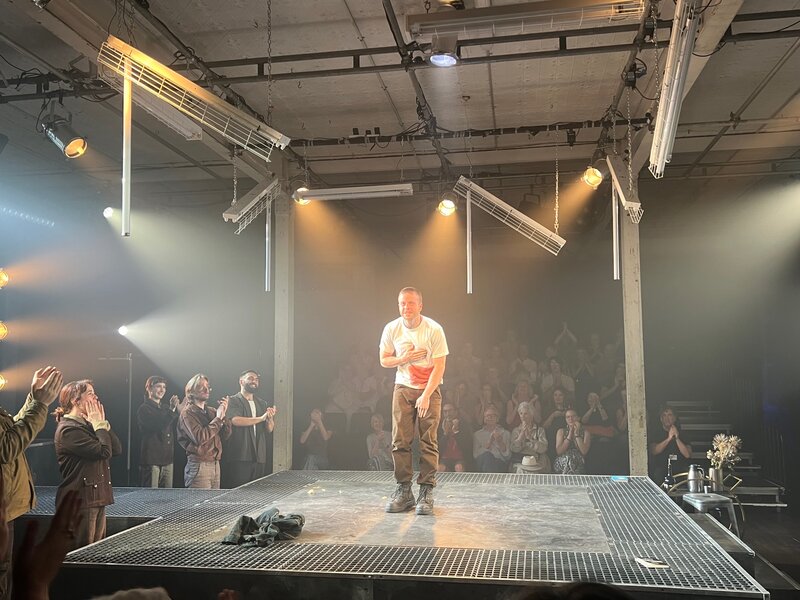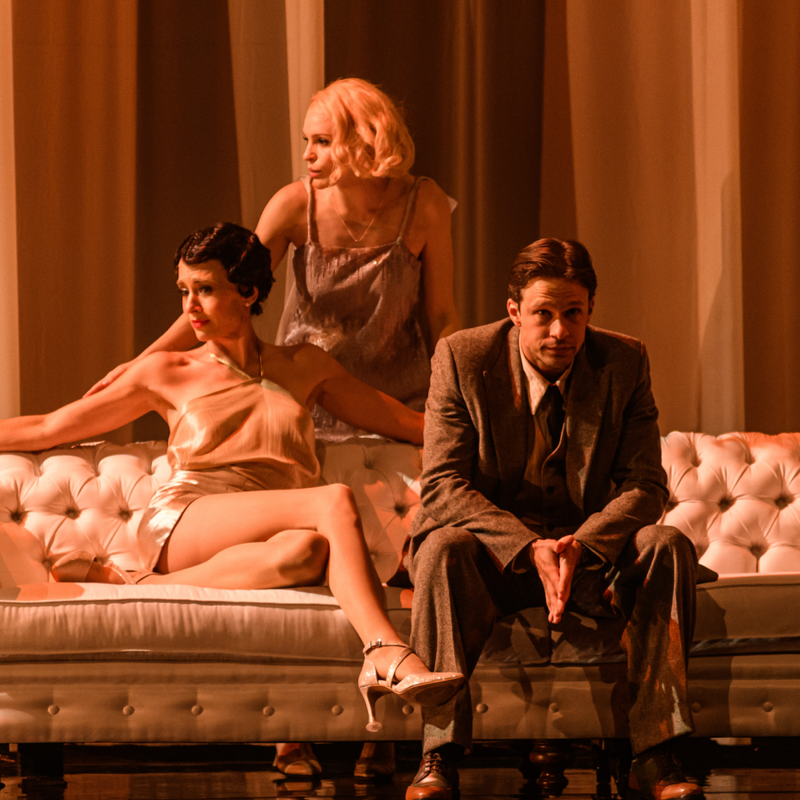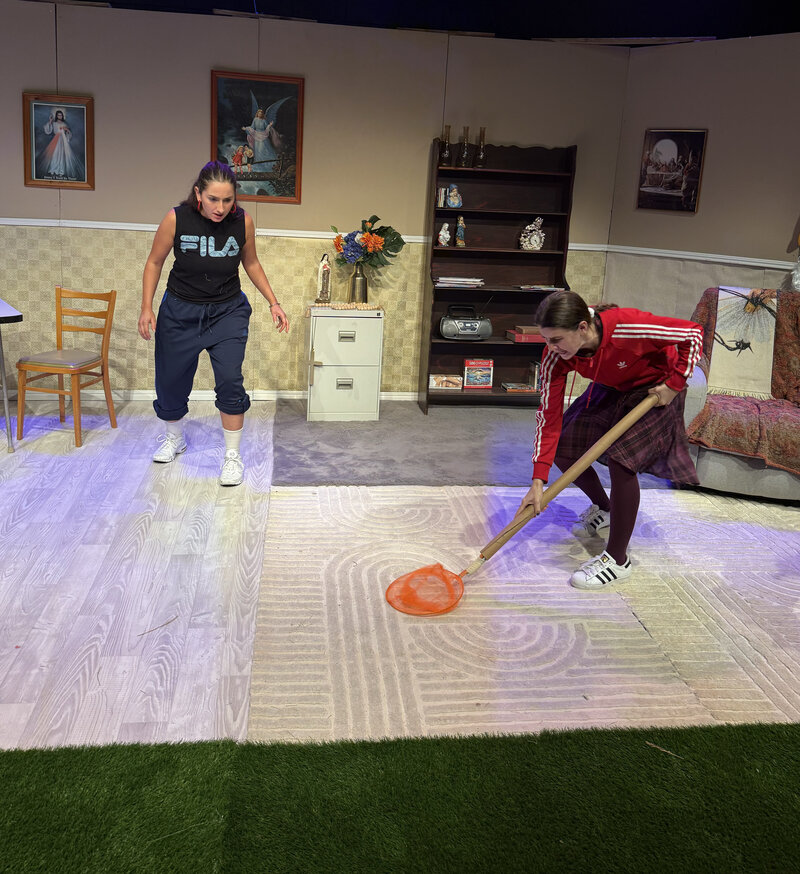Disgraced is the 2013 Pulitzer Prize winning play by Ayad Akhtar.
This is the typical well made American play that I talked about in my entry about The Whale. A small cast of five in a single setting with a subtly disguised exposition that introduces the protagonists with their differences and backgrounds.
- Emily (Sophie Ross), a middle aged white woman, a practising, ambitious ‘figurative’ artist – painter, politically naive and sexually duplicitous, married to
- Amir (Sachin Joab), a Pakastani with an adoptive Indian surname, an apostate Muslim, who has a career in Law, on the point of a possible partnership in his Firm.
- Abe (Shiv Palekar), a nephew of Amir’s who has become part of a radicalised Muslim youth movement, he is practising his faith, who seeks legal advice from Amir for a religious leader of his acquaintance, in ‘trouble’ with the American authorities.
- Issac (Glenn Hazeldine), an art curator from the Whitney Art Museum, a non-practising Jew, having had a recent affair with Emily, as well as sponsoring her into a new exhibition of contemporary art with a Middle eastern influence, but married to…
- Jory (Paula Arundel), an African-American lawyer from a working class background, in the same Firm as Amir, she, in competition with him for the same position for partnership.
Mr Ahktar sets the well oiled dramaturgical wheels in motion and brings the four adults together for a dinner party in Amir’s swanky apartment that explodes into revelations of firstly, hot button issues of race and Islamaphobia, and secondly, the melodrama of sexual peccadilloes between friends exposed. It is this wonderfully crafted dinner party scene that lifts this play into a contemporary ‘must see experience’ recommendation, for it is breathtakingly ‘in-yer-face’ and genuinely (thrillingly) shocking. I imagine it was triply so, in the theatre in New York, and may have been the frisson that scored it the Pulitzer Prize – for, otherwise, it is an utterly conventional dramaturgical construct – ‘4-square’ structural lines of plotting and character – not that I am underestimating the level of difficulty to achieve that ‘glory’: if only some more of our Australian writers had that proficiency at their finger tips, I reckon!

The whole play is given in a one act format of 90 minutes. The acting from all five is well prepared, if a little tentative at times – technical time styling seeming to hamper clearer character ‘arc’ revelations. The most comfortable actor seemed to be Mr Palekar, who was making his professional stage debut. But then, he was not involved in the necessary, and demanding, discipline of the orchestrated musical structure of the writing in the big dinner scene. It is extremely difficult to achieve, especially as the audience will subtly alter that rhythmical structure from night to night: it is knife-edge, in-the-moment stuff for the actor. Practice with audience will relieve the tentativeness of the performance I saw, and will free up the nightly necessary improvisations of timing with that new actor/character everynight: us, the audience. (One of the thrilling elements of a live performance for an actor.)
The Design, by Elizabeth Gadsby (set and costumes), of a contemporary New York apartment is extremely spacious, if appearing to be architecturally awkward, allowing for a Lighting Design, by Damien Cooper, with all that window, to do his job easily. Director, Sarah Goodes, manages the actors well, though electing to feature the several scene changes, into a puzzling set of choreographed ‘interludes’ (dances?), – one of them, the last, almost 4 minutes long! – involving the actors in a prop changing and costume changing ‘ritual’ in front of the audience, accompanied by a composition of, what I felt was a too indulged ‘Orientalist’ Middle Eastern flavoured sound, from a usually more reliable, Steve Francis, was odd. Just why this mis-step of judgement on Ms Gooodes’ part has happened I cannot tell (but then, perhaps, it was a forced pragmatic solution for a company [the STC] that, perhaps, has no budget for assistant stage management to do the task, otherwise?) The longeurs between scenes were not a useful ratchet to maintain the dramatic tensions of the music of the play ‘score’ written by Mr Akhtar. The actors had to ‘rev’ the gears of the play into action from an idling state each time it recommenced out of the scene changes, the audience having been suspended in an inertia of dramatic inaction, patiently waiting for the rudimentaries of design/directorial problems that the writing has ‘proposed’, to be technically- laboriously – solved.

The STC have two plays, King Charles III and Disgraced, playing in its theatres at the moment. Two texts addressing Hot Button issues – amazing. One is English. One is American. (There is as well Hay Fever over in the tourist haven, the Sydney Opera House.) Thank goodness for their curation in the season – I feel as if I am being treated as an adult living in the BIG world of DRAMA. Ideas to challenge me, to think about, in a communal space! For, it does concern me that our Australian playwrights do not seem to be much moved or interested with the ‘hot’, difficult and very pressing issues we find ourselves in the midst of. There are so many important issues, ripe for interrogation, right? So: “Writers find, and observe/research characters, and give them a dinner party, at least, to discuss our Issues. Please!” It was with a heavy heart that the night before at Carriageworks I sat amongst a Sydney audience in raptures over a 50 minute monologue about an unnamed, troubled body-double for a third rate actor called Kane: that was Lake Disappointment – a disappointment of urgent substance, indeed.
Disgraced is worth seeing. Interesting that there are other productions of the same play happening this year in some of our other cities. It was the most produced play in the United States last year. Recommended if you want to feel you are in a major theatre company in Australia and still, yet, part of an international ethical debate. The debate began, with this play, in 2013, but three years later, in 2016, I can assure you, it is still relevant.
No need to wait for the Sydney Writer’s Festival to be stimulated. Join the debate provocations at Disgraced, in the Wharf 1 Theatre.
Company: Sydney Theatre Company
Venue: Wharf 1 Hickson Rd., Walsh Bay
Dates: 16 April – 4 June 2016
Kevin Jackson
For more of Kevin Jackson’s theatre reviews, check out his blog at Kevin Jackson’s Theatre Diary

David Edwards is the former editor of The Blurb and a contributor on film and television




